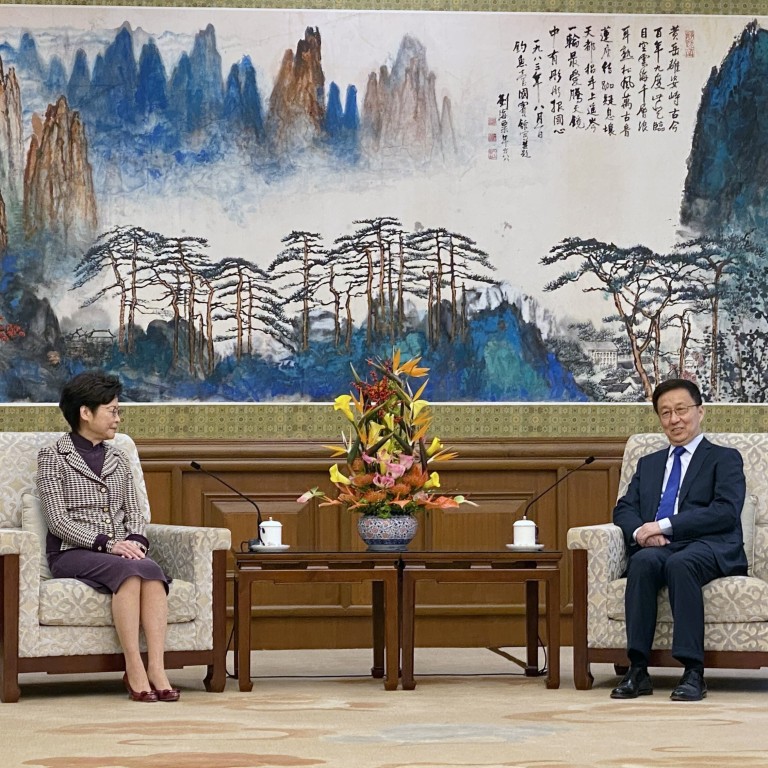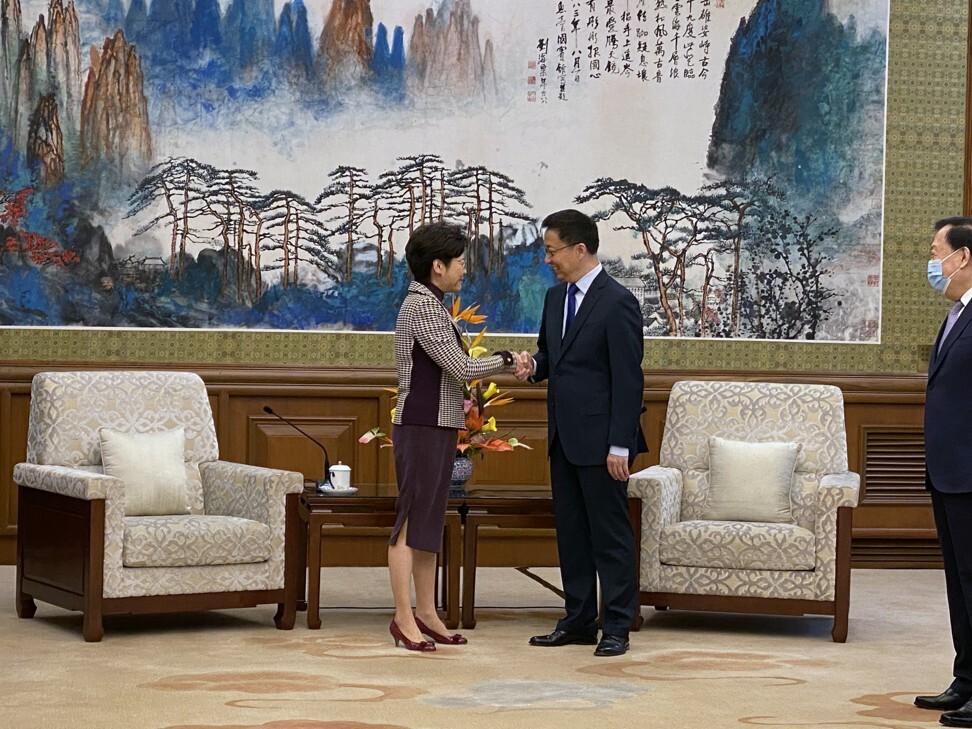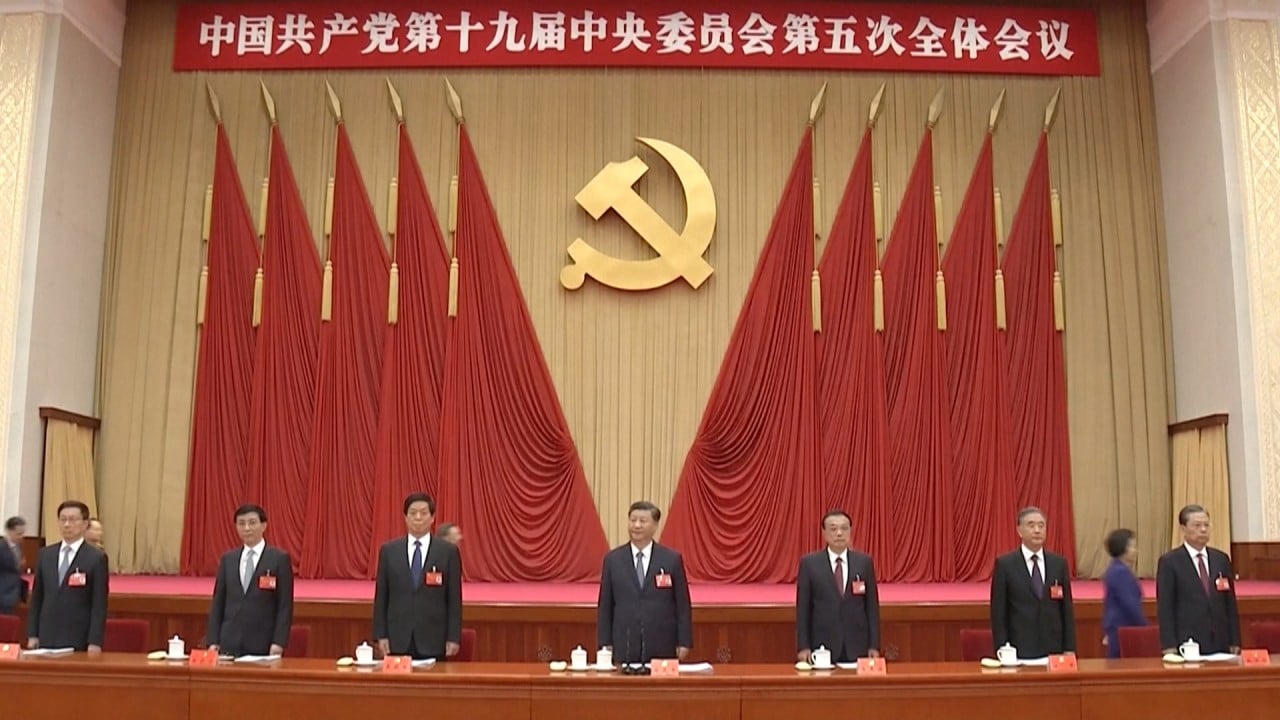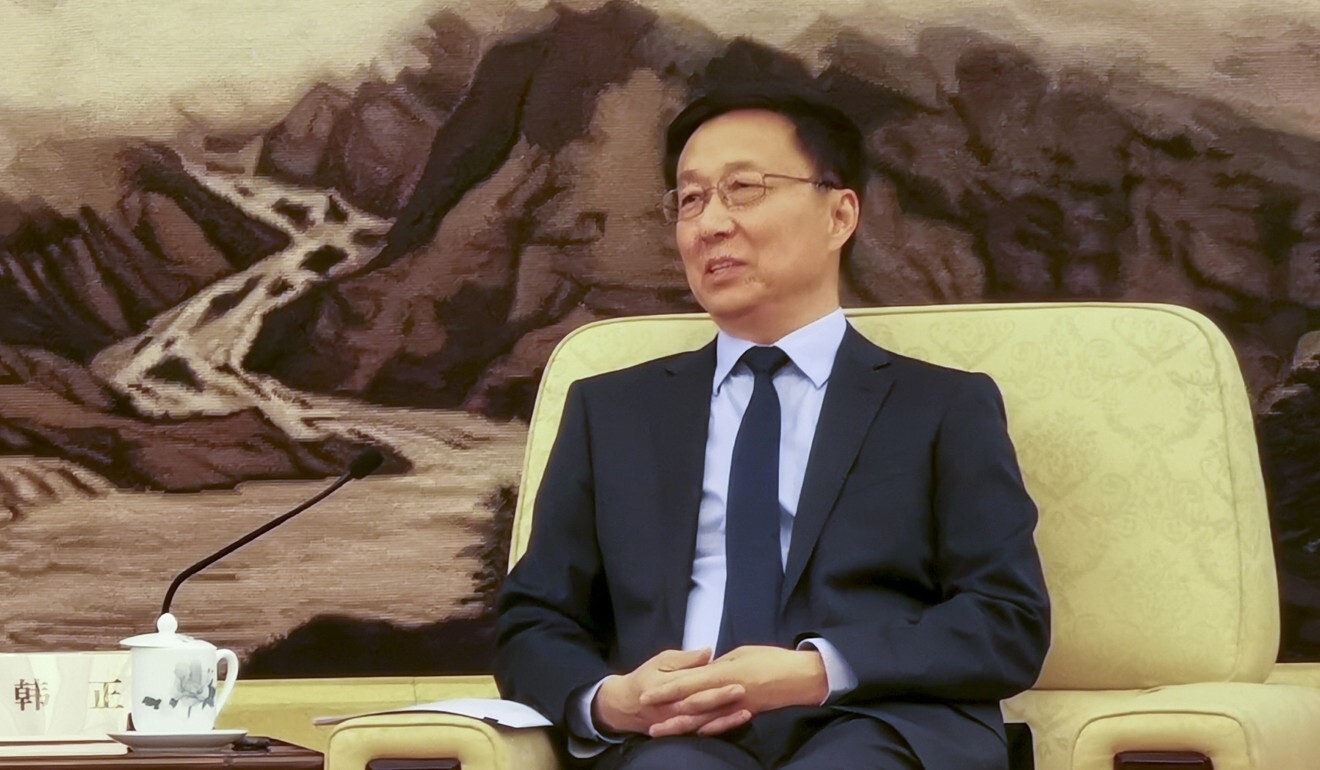
Hong Kong leader Carrie Lam, unable to secure border opening, leaves Beijing with ‘key task’ – bringing Covid-19 under control
- Vice-Premier Han Zheng also urges city to harness strengths and reap benefits of China’s development to revive embattled economy
- Lam travelled to the Chinese capital on Tuesday for policy talks designed to yield tangible measures for tackling Hong Kong’s myriad issues
Chief Executive Carrie Lam Cheng Yuet-ngor’s Friday meeting with Han capped a three-day visit in which she was instructed to better seize opportunities offered by China’s development but failed to secure an agreement to reopen the city’s borders with the mainland.
Xinhua said the vice-premier, the state leader overseeing Hong Kong affairs, had expressed hope Lam would make coronavirus containment “a first-class key task”.
“Hong Kong must strictly implement epidemic control measures, and coordinate the work to curb the pandemic, and revive the economy,” the state news agency quoted Han as saying.

“It must also step up coordination and planning … It must solve the current livelihood issues based on the residents’ urgent needs, and at the same time, have clear goals and directions, in order to gradually tackle the bottleneck [issues] that have been restricting Hong Kong’s long-term development.”
In a press briefing on Friday afternoon, Lam, who also earned praise from Han for tackling the city’s challenges “head-on”, said the mainland side was not yet ready to lift Covid-19 restrictions on Hongkongers, the most important issue on her agenda, and the city would have to work harder at containing the pandemic.
Various ministries strongly supported the suggestions raised by the city’s government, and gave us very good feedback … I hope to explain these in my policy address
Lam said the Beijing ministers the group met with had been receptive to the Hong Kong government’s policy proposals.
“Various ministries strongly supported the suggestions raised by the city’s government, and gave us very good feedback,” she said. “After returning to Hong Kong … we will tidy these up internally and I hope to explain these in my policy address.”
But asked if she had secured Beijing’s support in allowing Hong Kong people to enter the mainland without undergoing a mandatory 14-day quarantine, Lam said the city still had problems to solve.
“I have reflected that various sectors, including businesses and residents, have such strong aspirations … but in the end, it was Hong Kong that needs to be stricter on curbing the epidemic,” she said.
How important is Carrie Lam’s Beijing trip before Hong Kong policy address?
Lam noted her administration had recently decided visitors arriving from anywhere other than the mainland, Macau and Taiwan would be quarantined for 14 days in a hotel from next Friday. Local authorities would also step up testing.
“If we can do these well, I believe the central government will actively consider [border reopening], as it supports Hong Kong,” she said. “But as of today, I cannot tell you when we can achieve this goal.”
The chief executive was also asked by a mainland journalist whether she was aware many residents across the border were against the idea of allowing Hong Kong people to enter without quarantine.
“I hope mainland residents can set their minds at ease,” she said. “We would not ignore mainland people’s health, because of economic reasons or Hong Kong people’s demands.

03:05
What happened at the Chinese Communist Party’s major policy meeting, the fifth plenum?
“We still need to work hard before we can meet the standard to remove the quarantine requirement.”
Earlier in the morning, Han said in his meeting with Lam that while the central government “fully acknowledged” the work she had done, and would continue to “firmly support” her and the city’s administration, Hong Kong must seize the opportunities offered by the country’s development.
“Hong Kong also needs to [think of] how to better grasp the country’s development, and during this process, give full play to the city’s strengths, find better orientation, so that it can become better,” the vice-premier told the meeting.
Referring to the “strong support” central government agencies had offered Lam’s administration, he said: “They put forward lots of good policies, pieces of advice and work solutions.
Hong Kong leader visits mainland agencies for securities, development, health
“This fully demonstrates that the central government … will support whatever is beneficial to Hong Kong’s long-term prosperity and stability, the improvement of the people’s livelihood and well-being, as well as the city’s better integration into the nation’s development and the Greater Bay Area plans.”
Under the party recommendations revealed on Tuesday ahead of the drafting of the 2021-25 plan, which includes targets to be achieved by 2035, Beijing will support both cities in reinforcing their competitive advantages towards becoming a global technology hub.
The proposals also vowed to stop external forces from meddling in Hong Kong or Macau affairs as part of a strategy to strengthen national identity and patriotism over the next five years.

Han on Friday said central authorities would soon draft and finalise the new plan, adding it would be implemented after its endorsement at next year’s annual session of the National People’s Congress.
On the chief executive’s performance this year, Han said: “Under the central government’s firm leadership, we can say that Lam has led the [city’s] government in overcoming all kinds of difficulties, taking various challenges head-on.”
Speaking directly to Lam, he added: “In epidemic control, alleviating people’s hardship, reviving the economy, implementing the national security law and safeguarding Hong Kong’s stability, you have been proactive and have had significant achievements. The central government fully acknowledges your government’s work.
Cross-border travel tops agenda as Hong Kong leader heads to Beijing
“The central government has been consistent in firmly supporting chief executive Lam, and the [city’s] government in governing in accordance with the law.”
A source said after the press briefing on Friday afternoon, Lam had a video conference with about 30 Hongkongers living in Beijing. Her delegation was set to later travel to Guangzhou for meetings with the leaders of Guangdong province and Shenzhen on Saturday.
Lau Siu-kai, vice-president of the semi-official think tank the Chinese Association of Hong Kong and Macau Studies, said Han obviously “was not so satisfied” with the city’s contribution to national development.
“When Han mentioned that Hong Kong should better grasp the opportunities, he means that obviously the city is not doing well,” Lau said.
“But Han may not realise that many Hongkongers are still resistant to being part of China, with some still believing in separatism.”


